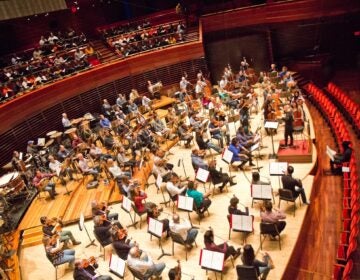End of an era, Germantown Settlement is no more
Thursday marked the end of an era in Germantown. A bankruptcy judge ordered the embattled 125 year old social service and housing agency, Germantown Settlement, to cash out.
Judge Stephen Raslavich had harsh words for the agency’s executive director, Emanuel Freeman, saying it would be, “leaving a fox in a henhouse if I left Mr. Freeman to go on about his way in charge of this entity.”
Freeman, a man known in part for his political relationships, was in the court room to hear judge Stephen Raslavich’s decision. (For more on Germantown Settlement and city contracts see the related story.) He had no comment.
Germantown Settlement started to receive massive levels of public and private funding in the 1990s but by 2004 state and federal tax liens began mounting up. The agency continued to expand into very large housing and commercial real estate developments and opened one of the city’s first charter schools. By 2009 legal claims against the agency reached into the tens of millions and the school district closed that charter school amid financial concerns that spurred a federal probe.
The court order means the bankruptcy case of Germantown Settlement will go from a Chapter 11 process, which allows for reorganization, to a Chapter 7 case, which calls for Settlement to sell off its remaining assets to satisfy creditors.
Most of the physical assets of the organization were held under the name of the Greater Germantown Housing Development Corporation, which Raslavich sent into liquidation midway through November.
But Irv Ackelsberg, who argued the case on behalf of a community group called Germantown Community Connection complained that real ownership of the property Settlement has amassed through all its subsidiaries was never clear in court.
“This (bankruptcy) case is one that was built on falsity and misleading disclosure from the beginning,” he told the judge.
Settlement lists interests in over 30 organizations on its Web site. According to public records those organizations control or have interests in at least 40 pieces of property located in or around Germantown, some of them quite large.
But it’s not clear how many of those assets will be up for sale. Some, like Freedom Square on the 5100 block of Germantown Avenue and the Burgess Center at 200 West Chelten Avenue are clearly in hock to public and private lenders for many millions of dollars.
Others, like the 220 unit Cricket Court Commons on Wissahickon Avenue, listed as a Settlement asset through a subsidiary, is not in default of its loans, according to the Redevelopment Authority, which funded that project.
Still, Acklesberg and others from GCC think it was a good day in court.
“I think it’s actually an exciting moment for Germantown,” he said.
He said it means other organizations like GCC can step in and do the things that Settlement was supposed to do in terms of community development but has not been able to.
For Mark Sellers, president of the Germantown Historical Society and Jim Foster, publisher of the Germantown Newspapers the liquidation is especially important, because it means Settlement and Emanuel Freeman will no longer be the go-to outlet in Germantown for politically directed funds.
“Manny had first shot at anything,” Foster claimed.
Dave Yurkey the chief of zoning for Eighth District Councilwoman Donna Reed Miller had a different view.
“We’ve done a lot of work with these guys over the years,” he said. “And the collapse of the last few years is kind of sad… you rob Peter to pay Paul, I think that a lot of CDCs do that, and some monies you can’t.”
Yurkey mentioned Cricket Court as a fine example of some of Settlement’s good work. It’s still among the nicer rental housing in the neighborhood, he said.
Yurkey also questioned the motivations of Ackelsberg and Foster because they had each previously run for city council against his boss. And he doubted the standing of Germantown Community Connection to speak for the community.
“It’s just a small organization with maybe two years track record,” he said. “It doesn’t represent Germantown.”
WHYY is your source for fact-based, in-depth journalism and information. As a nonprofit organization, we rely on financial support from readers like you. Please give today.




